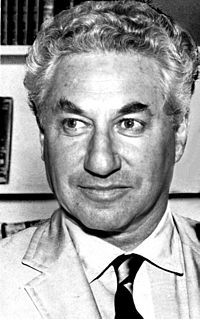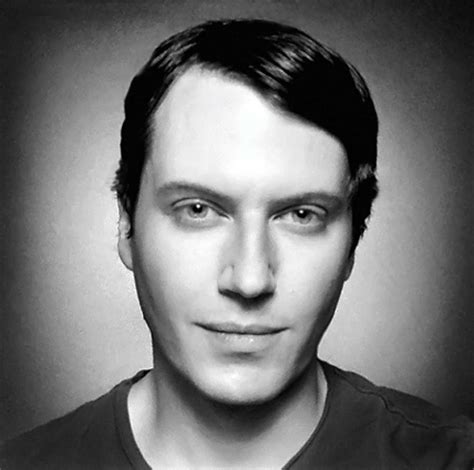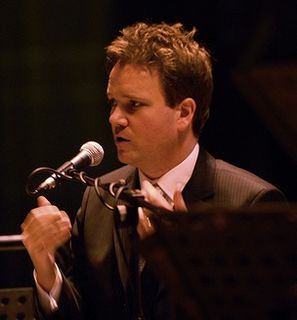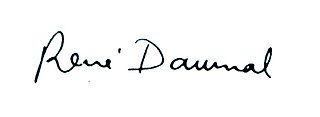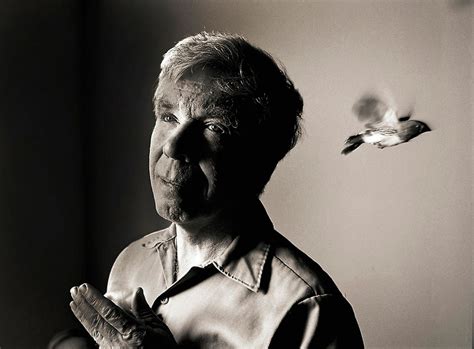A Quote by Budd Schulberg
Unless we know people well, we sit around with our words and our minds starched, afraid of being ourselves for fear of wrinkling them.
Related Quotes
We are afraid of ourselves and our own unconscious minds. When we are building something that reflects us, it's the one thing we're all afraid to face. We're afraid to face ourselves. Building machines that mirror our consciousness is a very frightening proposition because we have seen how evil people can be.
There is no hate without fear. Hate is crystallized fear, fear's dividend, fear objectivized. We hate what we fear and so where hate is, fear is lurking. Thus we hate what threatens our person, our liberty, our privacy, our income, our popularity, our vanity and our dreams and plans for ourselves. If we can isolate this element in what we hate we may be able to cease from hating... Hate is the consequence of fear; we fear something before we hate; a child who fears noises becomes the man who hates them.
If only the scientific experts could come up with something to get it out of our minds. One cup of fixit fizzle that will lift the dirt from our lives, soften our hardness, protect our inner parts, improve our processing, reduce our yellowing and wrinkling, improve our natural color, and make us sweet and good.
The Yogic sages say that all the pain of a human life is caused by words, as is all the joy. We create words to define our experience and those words bring attendant emotions that jerk us around like dogs on a leash. We get seduced by our own mantras (I'm a failure I'm lonely I'm a failure I'm lonely) and we become monuments to them. To stop talking for a while, then, is to attempt to strip away the power of words, to stop choking ourselves with words, to liberate ourselves from our suffocating mantras.
I think artists can influence only through making music that challenges people, excites them and flips them out. Music that repeats what you know in ever-decreasing derivation, that's unchallenging and unstimulating, deadens our minds, our imagination and our ability to see beyond the hell we find ourselves in.
What is life? Thoughts and feelings arise, with or without our will, and we employ words to express them. We are born, and our birth is unremembered and our infancy remembered but in fragments. We live on, and in living we lose the apprehension of life. How vain is it to think that words can penetrate the mystery of our being. Rightly used they may make evident our ignorance of ourselves, and this is much.
In the chapter on study we considered the importance of observing ourselves to see how often our speech is a frantic attempt to explain and justify our actions. Having seen this in ourselves, let's experiment with doing deeds without any words of explanation whatever. We note our sense of fear that people will misunderstand why we have done what we have done. We seek to allow God to be our justifier.
The conclusions seem inescapable that in certain circles a tendency has arisen to fear people who fear government. Government, as the Father of Our Country put it so well, is a dangerous servant and a fearful master. People who understand history, especially the history of government, do well to fear it. For a people to express openly their fear of those of us who are afraid of tyranny is alarming. Fear of the state is in no sense subversive. It is, to the contrary, the healthiest political philosophy for a free people.
Photographs are like our children. We put the best of ourselves into them - the best of our vision, our minds, our hearts - and then we send them out into the world. At some moment, perhaps the moment we click the shutter, they are being released. From that moment on, they don't really belong to us anymore.
The fact that God accepts us should be our motivation for accepting ourselves. If we cannot accept ourselves the way we are, with our limitations and assets, weaknesses as well as strengths, shortcomings as well as abilities; then we cannot trust anyone else to accept us the way we are. We will always be putting on a front, building a facade around ourselves, never letting people know what we are really like deep down inside.
